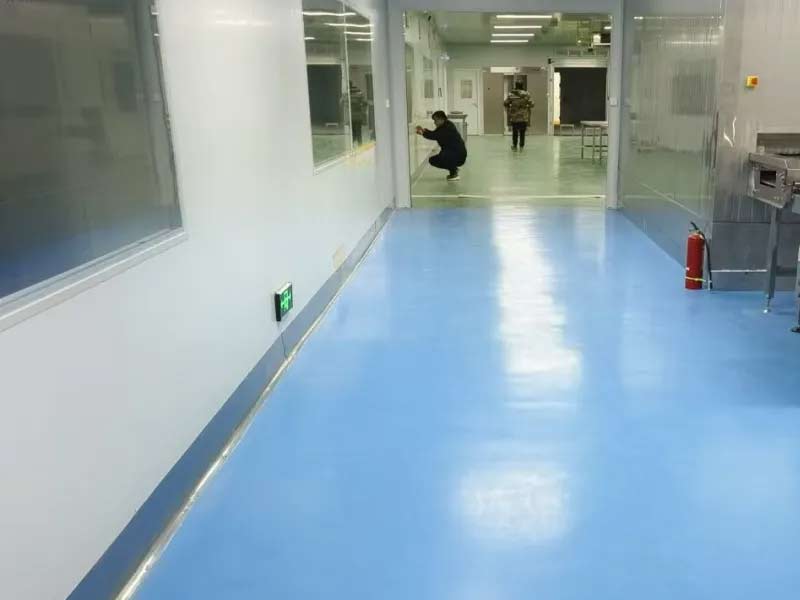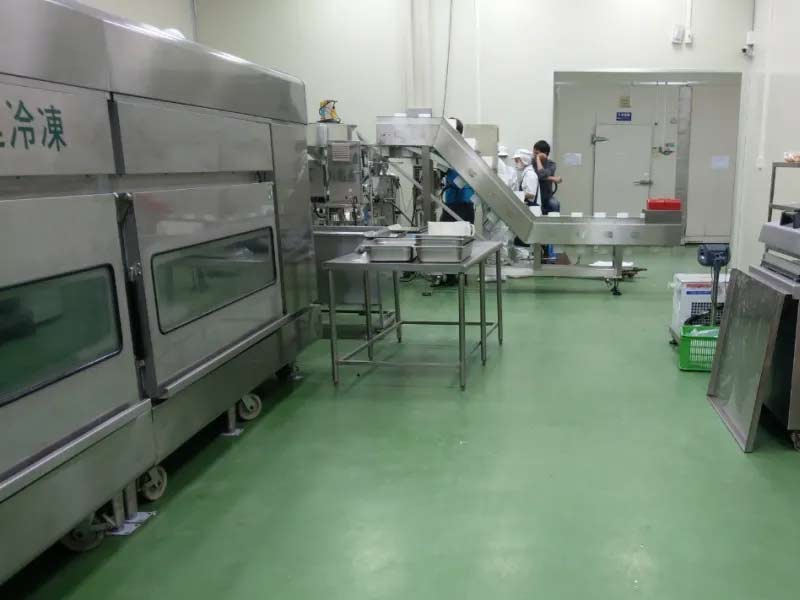Food Industry Flooring: Precision in Thickness Selection for Optimal Performance
In the highly regulated food industry, selecting the right flooring material is critical—especially when it comes to precision thickness control. This seemingly minor detail directly impacts cost efficiency, operational flow, and long-term ROI. Properly calibrated flooring thickness ensures seamless material handling and personnel movement, effectively paving a “highway” for productivity.
Central Kitchen Flooring: Optimizing Slip Resistance and Chemical Protection with Precision Thickness
As the operational heart of food processing facilities, central kitchens present some of the most demanding challenges for commercial food flooring. Daily exposure to water, food residues, grease, and highly corrosive starch solutions creates an environment where standard food factory flooring solutions frequently fail, leading to safety incidents and operational disruptions.
The ideal food-grade flooring for these critical areas must combine exceptional chemical resistance with reliable slip-resistant properties. Polyurethane mortar flooring systems have emerged as the premier solution, offering a protective barrier against prolonged exposure to acidic/alkaline substances while maintaining structural integrity. The recommended 4mm thickness specification represents the optimal balance – sufficient to withstand heavy traffic and equipment loads without premature wear, yet economical enough to control installation costs.
This specialized food industry flooring solution delivers three critical benefits for central kitchen operations:
1.Enhanced worker safety with R10-R12 slip resistance ratings on wet surfaces
2.Superior durability against thermal shock from frequent sanitation cycles
3.Cost-effective maintenance with 50-70% longer service life than traditional epoxy floors
Engineered to meet NSF/ANSI 372 standards for food contact surfaces, these non-porous flooring systems prevent bacterial growth while withstanding daily pressure washing and chemical disinfectants. The seamless installation eliminates grout lines where contaminants typically accumulate, significantly reducing cleaning time and water usage in high-volume food production environments.

Cold Storage Flooring: Overcoming Extreme Temperature Challenges with UD System Technology
Conventional cement and concrete floors demonstrate poor performance in cold storage facilities, where subzero temperatures critically compromise their structural integrity. Standard food factory flooring materials face severe challenges in these environments – cement becomes brittle in freezing conditions, while concrete’s inherent tendency to crack worsens under thermal cycling. These weaknesses lead to floor heaving, structural damage, and in extreme cases, complete cold storage facility failure, resulting in catastrophic operational and financial losses.
The JINYU PAINT® 8mm UD polyurethane mortar flooring system represents a breakthrough solution for food industry flooring in subzero environments. Rigorously tested through -40°C to ambient temperature cycles, this specialized cold storage flooring maintains exceptional freeze-thaw stability, seamlessly transitioning between frozen storage and ambient loading areas. Unlike traditional food processing floors that require frequent repairs in cold conditions, this advanced system delivers unmatched durability, reducing maintenance costs by up to 60% while minimizing product loss risks in the cold chain.
Key advantages of this ultra-low temperature flooring solution include:
- Thermal shock resistance that prevents cracking and heaving
- Seamless, non-porous surface eliminating bacterial harborage points
- Energy-efficient performance reducing refrigeration costs
- 30% longer service life compared to conventional cold storage floors
With its proven performance in USDA-compliant food facilities, this polyurethane mortar flooring system ensures optimal food safety while delivering significant total cost of ownership benefits for temperature-controlled food production environments.

Raw Material Pre-Processing Area: The First Line of Defense in Food Flooring Solutions
The raw material pre-processing zone serves as the critical entry point in food production facilities, where fresh produce, meats, and poultry undergo sorting, washing, and initial processing. This high-traffic area presents exceptionally demanding conditions for food factory flooring, with constant water exposure from washdowns and highly corrosive contaminants like blood, fruit acids, and organic debris.
When specifying flooring thickness for this zone, a 3-5mm polyurethane mortar flooring system delivers the optimal balance of performance and cost-efficiency. This range provides sufficient protection against the dual challenges of high-pressure water jets and abrasive material handling – thinner materials would degrade rapidly under such conditions, while excessive thickness would represent unnecessary capital expenditure.
The ideal food industry flooring solution here must excel in three key areas: chemical resistance (to withstand prolonged exposure to pH extremes from blood and fruit acids), slip resistance (R10-R12 rating for worker safety on wet surfaces), and easy-clean properties (seamless surfaces that prevent bacterial harborage). Polyurethane mortar flooring, with its proven performance in USDA and FSSC 22000-certified facilities, has become the material of choice – offering superior resistance to both chemical attack and thermal shock from frequent sanitation cycles.This specialized food processing floor solution not only extends service life by 3-5 times compared to traditional materials but also reduces water consumption during cleaning by up to 40% – a critical factor in sustainable food plant operations. The non-porous surface prevents liquid absorption, a common failure point in conventional floors that leads to bacterial growth and premature degradation.

